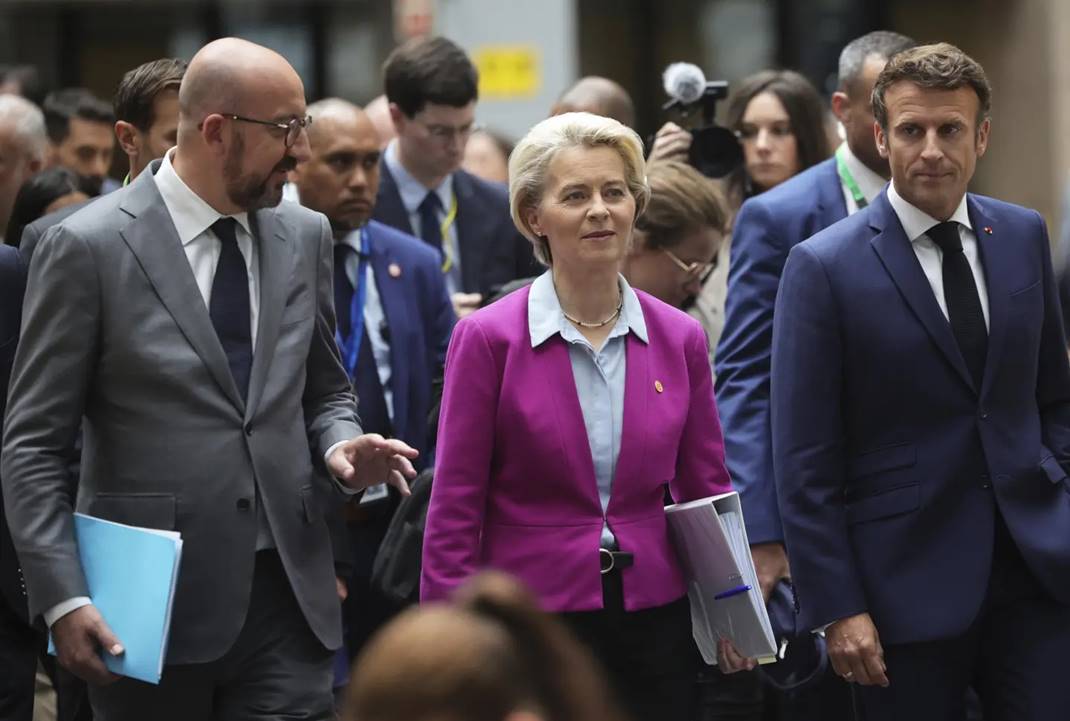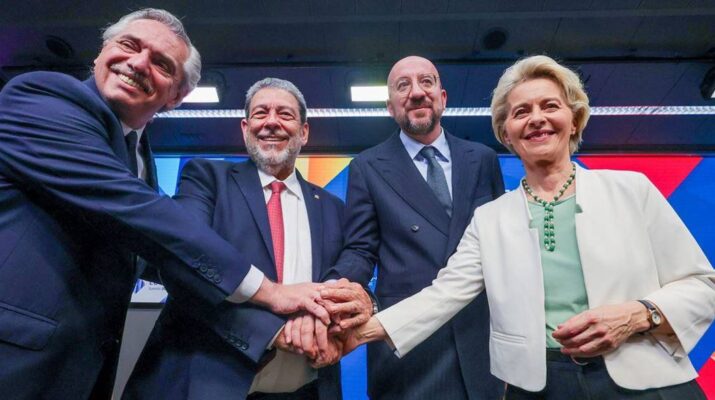The war in Ukraine, the enlargement of the EU, which the Balkan countries have been waiting for for two decades, but also the possible…

… the return of Donald Trump to power in the USA.
Five big challenges for the EU: Elections, enlargement, and maybe Trump
This is only part of the challenges that the European Union will face, writes DW.
The first challenge – Russia’s war in Ukraine
EU members have repeatedly promised to support Ukraine as much as necessary since a Russian victory would threaten the security of Europe. Will the EU stick to that pledge next year as well?
There is currently a lot of talk in Brussels about the loss of solidarity and war fatigue. The European Union is making huge efforts to unanimously approve aid to Ukraine. The strategy according to which Ukraine is left to negotiate with Russia or not, may be called into question in 2024, writes DW.
“Our goal must be a lasting and just peace, not another frozen conflict,” says European Commission President Ursula von der Leyen.
“Ukraine’s best path to stability and prosperity is membership in the European Union. For a Ukraine that is strengthening again, Europe is the answer.”
The second challenge – the enlargement of the European Union
With that, Ursula von der Leyen is talking about a step that for many members goes too fast and too far. Brussels should start accession negotiations with Ukraine and Moldova this year.
Membership in war-torn Ukraine would come at an enormous cost to the European Union. That is why even Ukraine’s great political friends, such as Poland or the Baltic states, began to fear such a scenario.
Those countries receive far more from Brussels than they pay, but with the admission of Ukraine, the situation could be reversed. Admittedly, the negotiations would begin, but until full membership, the agitated members would be calmed down by high officials of the Union for the past year, if not a decade.
The countries of the Western Balkans, which all want to become full members, and have spent two decades in the European waiting room, observe with displeasure the record speed with which the efforts of Ukraine and Moldova to secure EU membership are developing.
For Montenegro, Albania, and North Macedonia, specific dates of accession could be determined, among other things, to suppress Russian and Chinese influence in the Balkans.
For Serbia and Kosovo, those prospects are more modest because inter-ethnic conflict paralyzes overall progress. Bosnia and Herzegovina is struggling to overcome the status of a dysfunctional state. There, the conflict between the Bosnian Serbs and other nations, fueled by Russia, is the biggest obstacle.
The third challenge – reforms of the European Union
Before accepting new members, the European Union must reform its decision-making processes and the way it is financed. Only a sovereign, economically strong Europe can offer “reception capacity” – that’s what French President Emmanuel Macron has been claiming for a long time.
And the German government proposed more majority decision-making instead of unanimity. Informed circles in Brussels are not sure what will become of such proposals. If unanimous reasoning is to be abolished, that decision must be made – unanimously.
In the past few years, the EU could not reason with Poland and Hungary, which recklessly used their veto. Due to the deficit in the rule of law, the procedure does not produce results. During the year 2024, the opponent of the European Union, Viktor Orbán, will continue to rule firmly in Hungary. There is hope in Poland, as former European Council President Donald Tusk, a pro-European politician, has taken the helm.
20 years ago, after the accession of eight Central and Eastern European countries, as well as the island states of Malta and Cyprus, the EU adopted the “Lisbon Treaties” with some hesitation.
To this day, they are the basis for the work of the union of states. Do those contracts need to be adjusted? That discussion will be more and more present during 2024.
The fourth challenge – Donald Trump
If the radical Republican Donald Trump becomes the American president again, the European Union and the European part of NATO will face difficult times. The most important ally in supporting Ukraine and reining in Russia, as well as in trade matters, could fall away. To appease Trump, the EU could offer to finance military aid to Ukraine itself.
The German-American Chamber of Commerce expects that Donald Trump will introduce a whole series of punitive tariffs for Europeans. The European Union would have to do the same. Trade volume and economic growth would decrease. Would Trump further worsen bad relations with China, which is the most important trading partner of several European Union members?
The fifth challenge: Elections for the European Parliament
At the beginning of June, 400 million citizens of the European Union with the right to vote will elect their representatives for the European Parliament. That’s in theory. In practice, about 200 million voters voted last time. The victory of the Christian Democrats is expected again, but also the growth of the radical right-wing and populists.
According to polls, the most important topic for citizens is their economic situation and standards. According to these polls, Ukraine, migration, Union reforms, and enlargement are of less importance in deciding who to vote for.
German politician Ursula von der Leyen is likely to remain president of the European Commission. The new convocation of the European Parliament would have to confirm her mandate, but she would be proposed by 27 heads of state and government.
Despite the criticism, many people see the future of the EU positively
In addition to these big challenges, the coming year also brings several important tasks for Brussels. The reform of the procedure for the granting of political asylum, which is being debated, should acquire the status of a binding law as the so-called migration package.
Likewise, the EU must formulate new rules for the budgetary borrowing of its members. A law is also needed to regulate artificial intelligence. New investments in green technology must be provided.
The European Union, in addition to the budget of 1.1 billion euros for the next seven years, will require an additional 66 billion euros. The members are resisting, and this is a potential conflict between the northern states, which give more to the budget, and the southern ones, which spend more.
All this does not occupy the citizens too much. According to polls, they believe that they have too little influence on decisions in Brussels, but despite this, they are optimistic when it comes to the future of the European Union. An average of 60 percent of respondents have this attitude.
The worst result was measured in a country that is one of the founders of the European Union – France. There are optimists below 50 percent, which is the lowest percentage in the entire European Union. The highest percentage of optimists was measured in Denmark – 86 percent.
And in Germany, 58 percent of respondents positively see the development of the European Union during the next year.
(Pobjeda)
Napomena o autorskim pravima: Dozvoljeno preuzimanje sadržaja isključivo uz navođenje linka prema stranici našeg portala sa koje je sadržaj preuzet. Stavovi izraženi u ovom tekstu autorovi su i ne odražavaju nužno uredničku politiku The Balkantimes Press.
Copyright Notice: It is allowed to download the content only by providing a link to the page of our portal from which the content was downloaded. The views expressed in this text are those of the authors and do not necessarily reflect the editorial policies of The Balkantimes Press.

